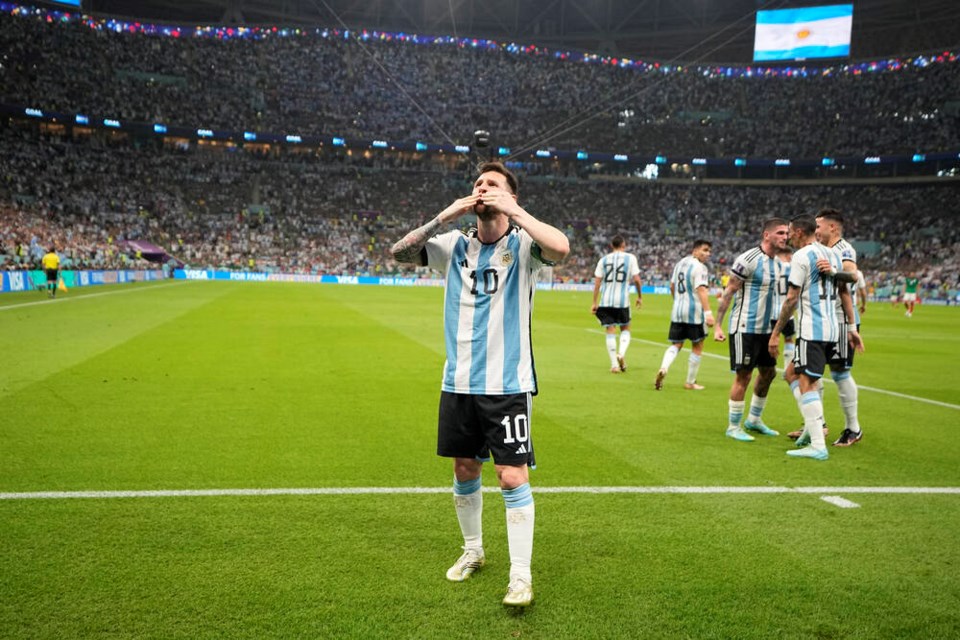Practise saying it: Nil.
As in “Netherlands beat Senegal two-nil.”
This is the only time you’ll ever hear Canadians use the word, once every four years during the planet’s most-watched sporting event, the soccer — er, football — men’s World Cup finals.
That’s when, like one of those stories where somebody gets struck by lightning and wakes up speaking a foreign language, mullet-headed hosers from Saanich to St. John’s somehow feel compelled to start talking as though they’re working for the BBC: “Argentina led one-nil until Saudi Arabia equalized at 48 minutes.” Instant experts, that’s us.
The month-long, 32-nation tournament is also when footie-mad Canadians take to the streets in a flag-waving frenzy more commonly associated with A) beating the U.S. at hockey, or B) vaccine protests.
Of course, we usually have to wave the flag of another country — Italy or Brazil or England, say — since up until now Canada has only made it to the finals once, in 1986. Mostly we get knocked out early in the qualifying stages, usually by one of those poor, hard-to-find-on-a-map countries where the CIA overthrows the government at halftime. Canada’s women team has performed at a high standard for years, even winning gold at last year’s Olympics, but historically Canada is to men’s soccer what Justin Trudeau is to country music.
Maybe our lack of success comes down to how we view the sport. The purpose of the Canadian game, as any soccer parent can tell you, is to raise money, mostly through the sale of raffle tickets outside grocery stores. Particularly good players, those who sell chocolate-covered almonds by the carton, might find themselves competing at the national level. In other countries, the season culminates with the cup final; in Canada, it’s the post-New Year’s bottle drive.
Once their kids start driving, parents tend to flee the field as though it were covered in snakes, promising themselves that they’ll never waste another soak-socking second shivering on the sidelines. This is in contrast to Europeans, who generally refuse to watch a match unless they’re being drenched by an icy, soul-sucking drizzle falling from an end-of-days sky. (“I never worried about hooligans,” an English acquaintance once said, “as much as I worried about someone rolling up a newspaper and peeing in my overcoat pocket.”)
Basically, Canadians traditionally have regarded soccer as a form of recreation for children while the rest of the world has viewed it as a proxy for armed conflict. Note that when playing Germany the English fans have been known to spread their arms and pretend to be RAF bombers, or to sing “two world wars and one world cup” to the tune of Camptown Races. Sometimes international soccer actually leads to war, as was briefly the case in 1969 when Honduras and El Salvador dropped the gloves (sorry, hockey analogy) within days of their World Cup qualifying match.
Really, international soccer is serious business. A Colombian player who accidentally scored on his own net in the 1994 World Cup finals was shot dead shortly after returning home. Saddam Hussein’s son Uday jailed and tortured players deemed to have failed Iraq.
To understand the depth of the emotion that the rest of the world invests in this game, just listen to the South American play-by-play. When someone scores, the announcer empties his soul like Marlon Brando wailing for Stella in A Streetcar Named Desire: “GOOOAAALLLLLLLL!” It comes out as an extended howl of despair, like you make when you just miss the ferry. The announcer then repeats himself — “Go-go-go-go-go GOOOAAALLLLLLLL!” — followed by a rapid-fire burst of excited Spanish, like Sofia Vergara tripping over the dog.
Alas, we Canadians have always missed out on this.
Until now.
This time, to the amazement of those who haven’t been paying attention, Canada is in the tournament, thanks to a generation of players who have found places to hone their skills both at home and abroad. Victoria has a pro team. In the eyes of the rest of the world, it’s as though we graduated from the children’s table at Christmas dinner.
Wednesday our squad played well in a one-nothi… er, nil… loss to Belgium, a respectable result against the second-ranked team in the world. Today it’s Croatia. Apparently we are, finally, a soccer nation after all. If only we could speak the language.
>>> To comment on this article, write a letter to the editor: [email protected]




